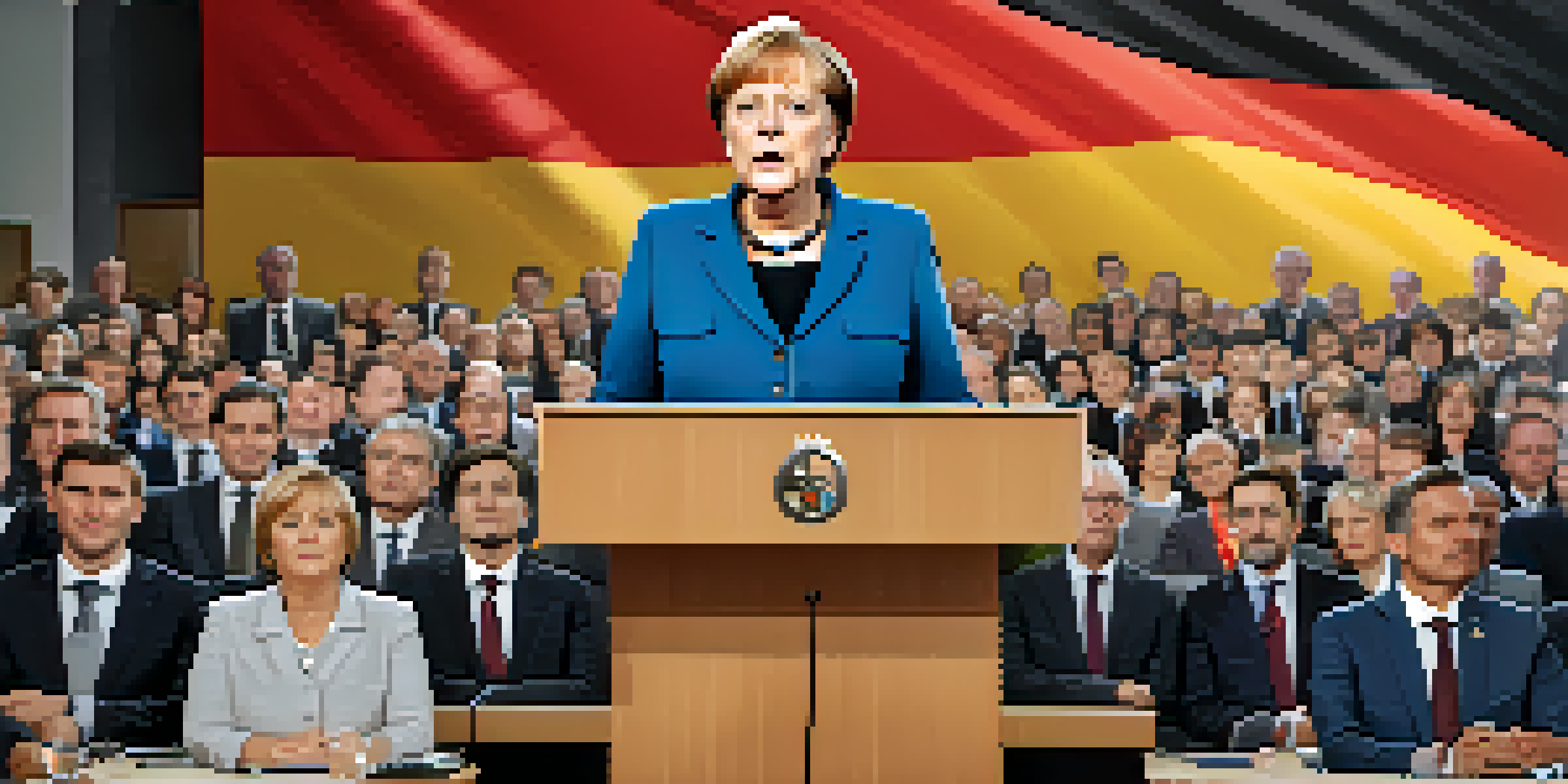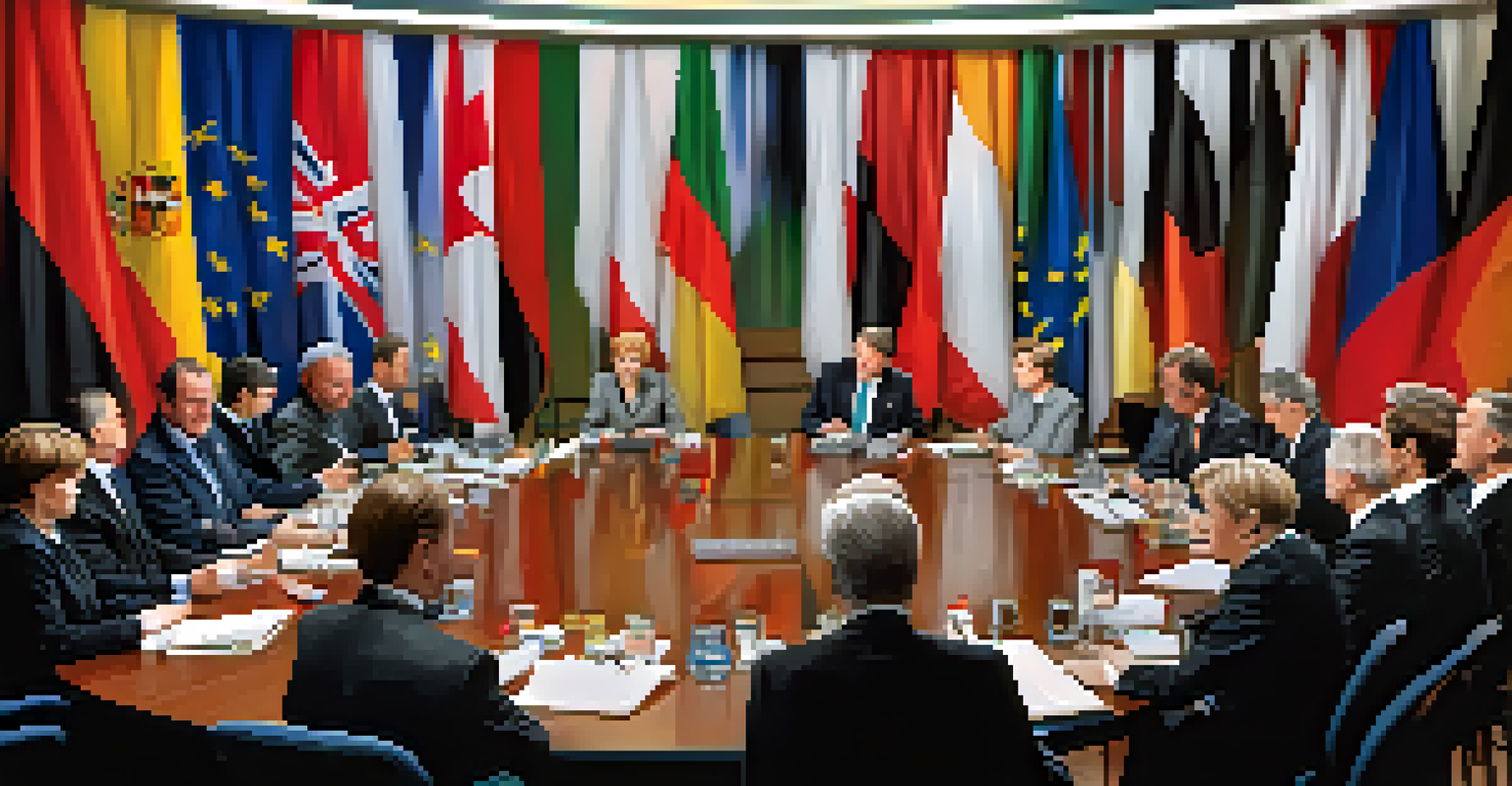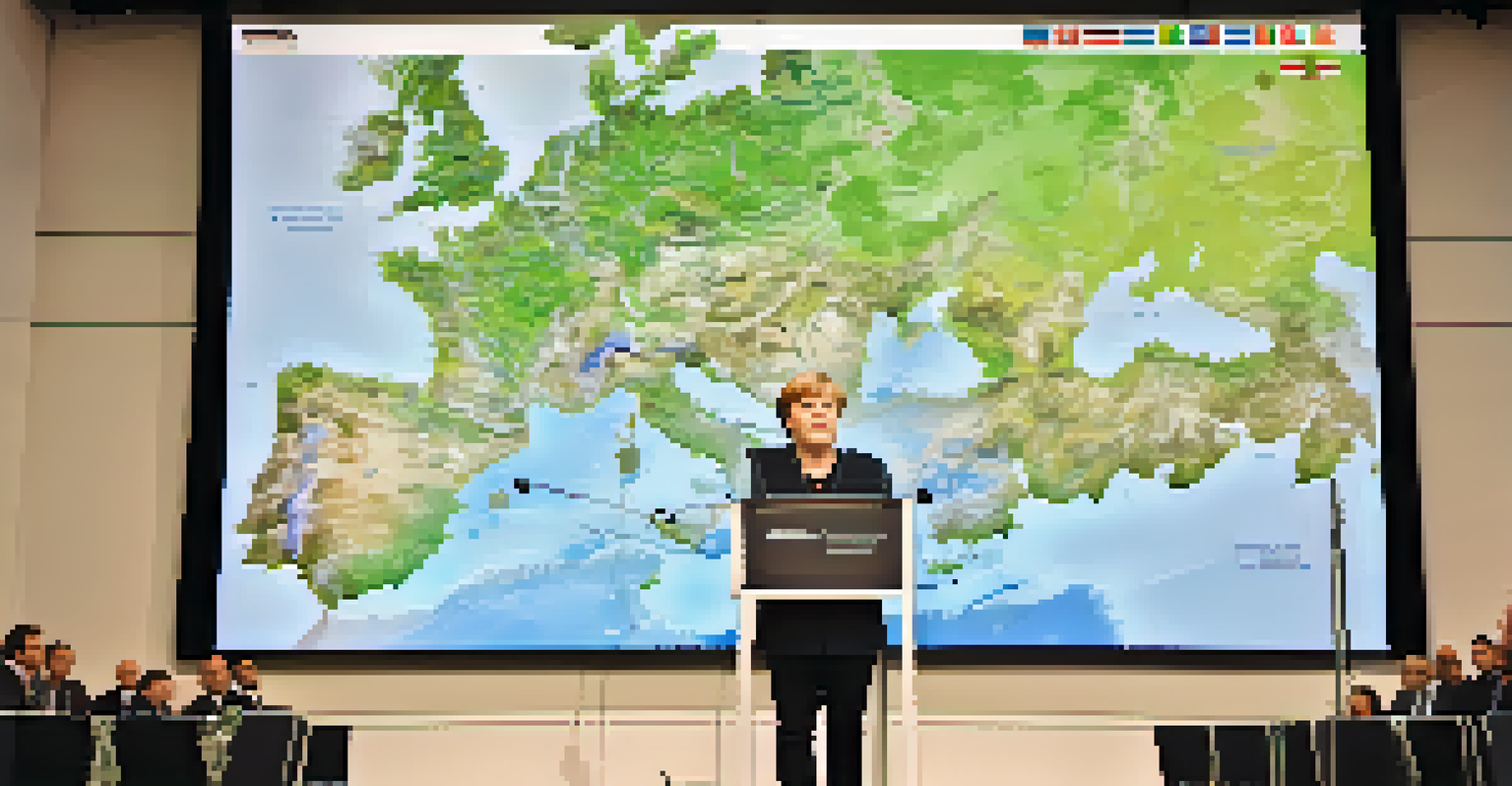Angela Merkel's Leadership: Crisis Management and Diplomacy

Early Challenges: Merkel's Rise Amidst Turmoil
Angela Merkel stepped into the chancellorship in 2005 during a period of uncertainty in Germany. The country faced economic stagnation and a divided political landscape. Her scientific background and methodical approach allowed her to navigate these challenges effectively, building trust among her constituents.
The greatest danger in times of turbulence is not the turbulence; it is to act with yesterday's logic.
Merkel's calm demeanor and analytical thinking quickly became hallmarks of her leadership style. She prioritized stabilizing the economy and fostering unity within her party and the nation. This early crisis management set the stage for her long tenure and established her as a reliable leader.
As she faced each challenge, Merkel demonstrated a remarkable ability to adapt her strategies, which helped her to resonate with the German populace. This adaptability proved crucial as the stakes continued to rise in the following years.
Handling the Eurozone Crisis: A Balancing Act
The Eurozone crisis posed a significant test for Merkel's leadership and diplomatic skills. Faced with the potential collapse of the euro, she had to balance domestic pressures with the needs of European partners. Merkel's approach was marked by a commitment to fiscal discipline while also advocating for bailout packages.

This balancing act required not just economic acumen but also political finesse. Merkel often found herself negotiating with leaders across Europe, showcasing her ability to unite diverse viewpoints. Through her efforts, Germany emerged as a stabilizing force within the Eurozone.
Merkel's Pragmatic Crisis Leadership
Angela Merkel's methodical approach and adaptability during various crises established her as a reliable leader in Germany.
While her decisions were sometimes met with criticism at home, Merkel's insistence on European solidarity helped to foster a sense of shared responsibility among nations. This approach ultimately reinforced her status as a key player in European politics.
The Refugee Crisis: Compassion Meets Pragmatism
The 2015 refugee crisis presented one of the most profound moral and logistical challenges of Merkel's leadership. With thousands fleeing war and persecution, Merkel made a bold decision to open Germany's borders, famously declaring, 'We can do this.' This humanitarian stance showcased her compassion and commitment to human rights.
In a world where you can be anything, be kind.
However, this decision was not without its complexities. Merkel faced intense backlash from both domestic and international audiences, with critics arguing that her approach could destabilize Germany. Despite this, she maintained her position, emphasizing the importance of solidarity and compassion in times of crisis.
Merkel's handling of the refugee situation has become a defining moment of her chancellorship. It highlighted her ability to blend empathy with strategic thinking, further solidifying her legacy as a leader willing to take risks for the greater good.
Climate Diplomacy: Leading the Global Charge
Merkel has long been an advocate for climate action, positioning Germany as a leader in global environmental efforts. Her background in science fueled her passion for sustainability, making her a credible voice in international discussions. She played a pivotal role in the Paris Agreement negotiations in 2015, advocating for ambitious climate targets.
Through her leadership, Merkel helped to frame climate change not just as an environmental issue, but as a matter of global security and economic opportunity. By championing renewable energy initiatives at home, she aimed to inspire other nations to follow suit.
Compassion in Refugee Policies
Merkel's bold decision to open Germany's borders during the 2015 refugee crisis highlighted her commitment to humanitarian values.
Merkel's commitment to climate diplomacy demonstrated her foresight and understanding of interconnected global challenges. This proactive approach allowed her to maintain Germany’s influential position on the world stage, even as climate issues became increasingly contentious.
Navigating International Relations: A Steady Hand
Throughout her tenure, Merkel became known for her pragmatic approach to international relations. She often emphasized the importance of dialogue and cooperation, even in the face of geopolitical tensions. This philosophy was evident in her dealings with Russia, as she sought to balance confrontation with diplomacy.
Merkel's analytical mindset enabled her to navigate complex global dynamics, whether it was managing relations with the United States or addressing rising tensions in Eastern Europe. She understood that maintaining open channels of communication was vital for fostering stability.
Her steadiness in international affairs garnered respect from leaders worldwide, reinforcing her image as a reliable and thoughtful negotiator. Merkel's ability to remain calm under pressure was a critical asset in navigating these turbulent waters.
Legacy of Leadership: Lessons from Merkel's Tenure
As Merkel stepped down in 2021, her legacy was firmly etched in the annals of modern politics. Her unique blend of crisis management and diplomacy set standards for leadership that many will study for years to come. She demonstrated that strong leadership often requires a commitment to both pragmatism and empathy.
The lessons drawn from her tenure include the importance of adaptability, the value of listening to diverse perspectives, and the need for decisive action in times of crisis. These principles not only shaped her policies but also influenced a generation of leaders around the world.
Legacy of Stability and Unity
Merkel's focus on fostering stability and cooperation will continue to influence Germany's political landscape and future leadership.
Merkel's leadership journey serves as a reminder that effective governance hinges on the ability to balance complex challenges while remaining true to core values. As the world continues to face new crises, her example will undoubtedly inspire future leaders to approach challenges with a steady hand and an open heart.
The Future of Germany: A Reflection on Merkel's Influence
With Merkel’s departure, Germany stands at a crossroads, influenced by her legacy in numerous ways. Her focus on stability and unity has left an indelible mark on the political landscape, shaping the priorities of her successors. The challenge now is to build upon the foundation she established while addressing new and emerging issues.
As new leaders emerge, they will need to navigate the complexities of a changing world, where globalization, climate change, and social justice demand attention. Merkel's emphasis on diplomacy and collaborative solutions will serve as a guiding principle for those who follow in her footsteps.

Ultimately, the future of Germany will reflect both the lessons learned from Merkel's leadership and the adaptability of its new leaders. Her influence will undoubtedly resonate as the nation continues to address the challenges of the 21st century.